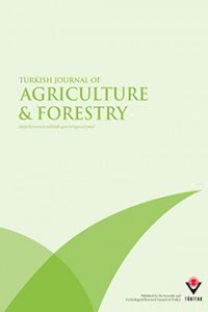Diversity analysis of genetic, agronomic, and quality characteristics of bread wheat (Triticum aestivum L.) cultivars grown in Turkey
Turkey is an important bread wheat producer. The objective of this study was to dissect the diversity of genetic, agronomic, and quality characteristics of bread wheat cultivars grown on 25% of the total wheat area in Turkey. A total of 24 wheat cultivars and 5 wild progenitors of wheat were examined using 24 simple sequence repeat (SSR) primers with a known physical locus on the A, B, and D genomes of hexaploid wheat. A total of 72 bands produced 939 alleles on the wheat cultivars and wild progenitors. Markers were efficient in discriminating the species and the highest genetic diversity information was obtained from the markers Xgwm312 and Xgwm372. Microsatellite markers clearly separated cv. Pandas from all other cultivars although it was closely related to most of them in terms of agronomic and quality traits. Four agronomic characteristics including yield component traits and eight bread quality analyses were used for the diversity analyses. A significant association between morphological and bread wheat quality traits was observed while the correlation was weak with the genetic data. Cultivars were also classified with respect to release year and origin. Molecular variance between old (released before the year 2000) and new cultivars accounted for 1% of the total variation and the variance was 3% between national and foreign cultivars. Results showed that the number of alleles was lower in national and new cultivars compared to foreign and old cultivars. Therefore, breeding sources do not appear to improve the genetic base of wheat cultivars in Turkey. Introducing new variation sources may be needed to broaden the narrowed gene pool of bread wheat.
